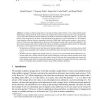Free Online Productivity Tools
i2Speak
i2Symbol
i2OCR
iTex2Img
iWeb2Print
iWeb2Shot
i2Type
iPdf2Split
iPdf2Merge
i2Bopomofo
i2Arabic
i2Style
i2Image
i2PDF
iLatex2Rtf
Sci2ools
125
click to vote
EUROCRYPT
2008
Springer
2008
Springer
Detection of Algebraic Manipulation with Applications to Robust Secret Sharing and Fuzzy Extractors
Consider an abstract storage device (G) that can hold a single element x from a fixed, publicly known finite group G. Storage is private in the sense that an adversary does not have read access to (G) at all. However, (G) is non-robust in the sense that the adversary can modify its contents by adding some offset G. Due to the privacy of the storage device, the value can only depend on an adversary's a priori knowledge of x. We introduce a new primitive called an algebraic manipulation detection (AMD) code, which encodes a source s into a value x stored on (G) so that any tampering by an adversary will be detected, except with a small error probability . We give a nearly optimal construction of AMD codes, which can flexibly accommodate arbitrary choices for the length of the source s and security level . We use this construction in two applications:
| Added | 19 Oct 2010 |
| Updated | 19 Oct 2010 |
| Type | Conference |
| Year | 2008 |
| Where | EUROCRYPT |
| Authors | Ronald Cramer, Yevgeniy Dodis, Serge Fehr, Carles Padró, Daniel Wichs |
Comments (0)

